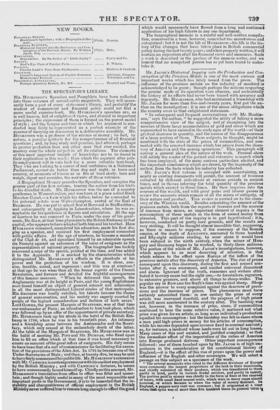THE SPECTATOR'S LIBRARY.
MR. Husicissoses Speeches and Pamphlets have been collected into three volumes of considerable magnittide. They will neces- sarily form a part of every statesman's library, and probablfthe student of commercial and financial policy could not find a more useful exercise-book. Mr. HUSKISSON'S speeches are, as is well known, full of enlightened views, and abound in important principles ; the expression of them is formed on the purest model of style ; and the temper and tone in which his argument is con- ducted may fairly be represented as a perfect example of the manner of carrying on discussion in a deliberative assembly. Mr. Husnissou was- a professor of the science of money ; he had, by nature, a peculiar aptitude for the comprehension of all financial questions ; and, by long study and practice, had attained, perhaps in greater perfection than any other man that ever existed, the mastery over the whole subject in all its relations. The elements of this most important branch of knowledge are to be found in their application in this work ; than which the aspirant after pub- lic employment will in vain look for a more valuable text-book. They who are looking to a career of real usefulness in a Reformed Parliament, cannot do better than day and night, in town and country, at moments of leisure or in fits of hard study, turn and weigh, digest and consider, the contents of these volumes.
A Biographical Memoir precedes the Speeches, and occupies the greater part of the first volume, tracing the author from his birth to his dreadful death. Mr. HUSKISSON was the son of a country gentleman in Worcestershire, and was born at a place called Birch Moreton Court,—a farm which his father, before he succeeded to his paternal estate near 1,Volverliampton, rented of the Earl of BELMONT. He was put to school. first at Brewood in Staffordshire, and subsequently at Appleby in Leicestershire, where he was re- markable for his quickness in figures and calculation. At the age of fourteen he was removed to Paris, under the care of his great- uncle, Dr. GEM, at that time physician to the British Embassy in that capital, who appears to have adopted both him and his brother. Here HUSKISSON remained, completed his education; made his first dis- play as a speaker, and received his first employment connected with public affairs. At the age of nineteen, he became a member of the Club de 89, and signalized himself by an admirable speech (in French) against an extension of the issue of assignats as the representatives of national property. The biographer has luckily recovered a copy of the speech, printed at the time, and has added it to the Appendix. It is marked by the characteristics which distinguished Mr. HusitissoN's efforts in the plenitude of his power and the perfection of his wisdom. It is clear, con- cise, forcible, sound, and ingenious : and this was at nineteen ! at, that age he was wiser than all the beaux esprits of the French Revolution, and foresaw and detailed the frightful consequences of this famous measure. " When he delivered this speech, the Anglomanie was at its height in Paris, and the young Englishman soon found himself an object of general interest and admiration in all the most distinguished Liberal circles of that metropolis. His discourse was loudly extolled, his talents became the theme of general conversation, and his society was eagerly courted by people of the highest consideration and fashion of both sexes." Lord GOWER, the present Marquis of STAFFORD, was at that time cur ambassador at Paris ; an introduction to him took place, which was followed up byan offer of the appointment of private secretary. Mr. HusKissoN took up his abode in the hotel of the British Em- bassy in 1790, when he was in his twentieth year. An intimacy and a friendship arose between the Ambassador and the Secre- tary, which only ceased at the melancholy death of the latter. At the table of the Marquis of STAFFORD, Mr. HUSKISSON was in the habit of meeting Mr. PITT and Mr. DUNDAS; who fixed upon him to fill an office which at that time it was found necessary to create on account of the great influx of emigrants. His duty seems to have been that of a sort of commissioner for facilitating the execu- tion of the provisions of the Alien Act. In 1795 he became One of the Under-Secretaries of State ; and then, at twenty-five, he may be said to have fairly commenced his public life. Mr. H USEISSON'S connexion with Mr. CANNING is contemporaneous with his earliest employment by the British Ministry ; and with CANNING'S fortunes, he seems to have unnecessarily bound himself up. Chiefly on this account, Mr. HUSKISSON'S translation from office to office was fitful and uncer- tain; and though highly useful in many of the most responsible and important posts in the Government, it is to be lamented that the in. stability and changeableness of official employment in the Britisla Ministry never suffered him to remain longQw.kgh to effect the, Ved which would necessarily have flowed from a long and continued application of his high talents in any one department. The biographical memoir is a careful and well-written compila- tion, conceived in a tone, however, somewhat too monotonous and eulogistical : but it is not the life of Husiossoar—his life is the his- tory of the changes that have taken place in British commercial policy during the last twenty years ; and when properly written, it will contain an exposition of all his financial views and measures. Such a work is described in the preface of the memoir-writer, and we lament that no competent person has as yet been found to under- take it.


























 Previous page
Previous page